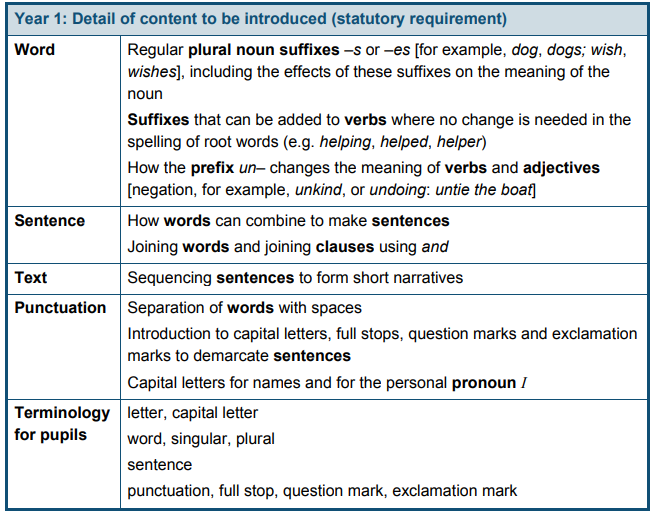Through the English curriculum we believe that all pupils should be able to communicate their knowledge, ideas thoughts and feelings through their writing. We want pupils to acquire a range of vocabulary and an understanding of grammar. We provide the children with the skills to be able to spell new words by effectively applying the spelling patterns and rules they learn in phonics. We believe that all pupils should be encouraged to take pride in the presentation of their writing.
Reading – word reading
- apply phonic knowledge and skills as the route to decode words
- respond speedily with the correct sound to graphemes (letters or groups of letters) for all 40+ phonemes, including, where applicable, alternative sounds for graphemes
- read accurately by blending sounds in unfamiliar words containing GPCs that have been taught
- read common exception words, noting unusual correspondences between spelling and sound and where these occur in the word
- read words containing taught GPCs and –s, –es, –ing, –ed, –er and –est endings
- read other words of more than one syllable that contain taught GPCs
- read words with contractions [for example, I’m, I’ll, we’ll], and understand that the apostrophe represents the omitted letter(s)
- read books aloud, accurately, that are consistent with their developing phonic knowledge and that do not require them to use other strategies to work out words
- reread these books to build up their fluency and confidence in word reading
Reading – comprehension
- develop pleasure in reading, motivation to read, vocabulary and understanding by:
- listening to and discussing a wide range of poems, stories and non-fiction at a level beyond that at which they can read independently
- being encouraged to link what they read or hear to their own experiences
- becoming very familiar with key stories, fairy stories and traditional tales, retelling them and considering their particular characteristics
- recognising and joining in with predictable phrases
- learning to appreciate rhymes and poems, and to recite some by heart
- discussing word meanings, linking new meanings to those already known
- understand both the books they can already read accurately and fluently and those they listen to by:
- drawing on what they already know or on background information and vocabulary provided by the teacher
- checking that the text makes sense to them as they read, and correcting inaccurate reading
- discussing the significance of the title and events
- making inferences on the basis of what is being said and done
- predicting what might happen on the basis of what has been read so far
- participate in discussion about what is read to them, taking turns and listening to what others say
- explain clearly their understanding of what is read to them
Writing – transcription
- spell:
- words containing each of the 40+ phonemes already taught
- common exception words
- the days of the week
- name the letters of the alphabet:
- naming the letters of the alphabet in order
- using letter names to distinguish between alternative spellings of the same sound
- add prefixes and suffixes:
- using the spelling rule for adding –s or –es as the plural marker for nouns and the third person singular marker for verbs
- using the prefix un–
- using –ing, –ed, –er and –est where no change is needed in the spelling of root words [for example, helping, helped, helper, eating, quicker, quickest]
- apply simple spelling rules and guidance, as listed in English appendix 1
- write from memory simple sentences dictated by the teacher that include words using the GPCs and common exception words taught so far
Handwriting
- sit correctly at a table, holding a pencil comfortably and correctly
- begin to form lower-case letters in the correct direction, starting and finishing in the right place
- form capital letters
- form digits 0-9
- understand which letters belong to which handwriting ‘families’ (ie letters that are formed in similar ways) and to practise these
Writing – composition
- write sentences by:
- saying out loud what they are going to write about
- composing a sentence orally before writing it
- sequencing sentences to form short narratives
- re-reading what they have written to check that it makes sense
- discuss what they have written with the teacher or other pupils
- read their writing aloud, clearly enough to be heard by their peers and the teacher
Writing – vocabulary, grammar and punctuation
- develop their understanding of the concepts set out in English appendix 2by:
- leaving spaces between words
- joining words and joining clauses using ‘and’
- beginning to punctuate sentences using a capital letter and a full stop, question mark or exclamation mark
- using a capital letter for names of people, places, the days of the week, and the personal pronoun ‘I’
- learning the grammar for year 1 in English appendix 2
- use the grammatical terminology in English English appendix 2in discussing their writing
Vocabulary, Grammar and Punctuation
The grammar of our first language is learnt naturally and implicitly through interactions with other speakers and from reading. Explicit knowledge of grammar is very important. Building this knowledge is best achieved through a focus on grammar within the teaching of reading, writing and speaking. Once pupils are familiar with a grammatical concept [for example ‘modal verb’], they should be encouraged to apply and explore this concept in the grammar of their own speech and writing and to note where it is used by others.
English appendix 2

